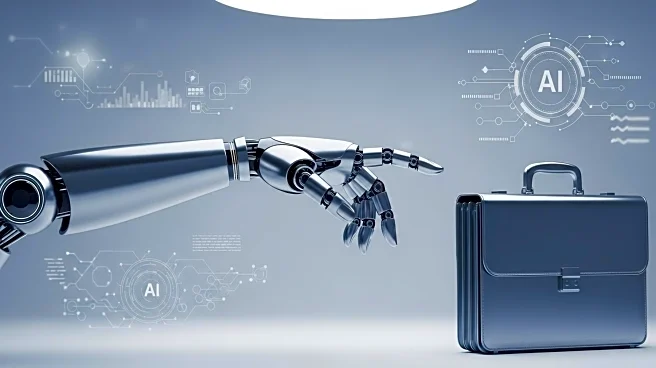What's Happening?
Generative AI is set to significantly impact the job market, particularly affecting white-collar roles in technology and finance. According to a report by Indeed, 26% of jobs posted on the platform are likely to undergo radical transformation due to AI. Generative AI, exemplified by tools like OpenAI's ChatGPT and Google's Gemini, can mimic human cognitive skills, creating original content such as text, images, and software code. While roles in nursing and blue-collar jobs remain insulated from AI's reach, positions requiring analytical skills and higher education are most exposed. The debate continues on whether AI will automate jobs, making them obsolete, or augment them, enhancing productivity.
Why It's Important?
The potential impact of AI on the job market is profound, with significant implications for industries reliant on cognitive skills. While AI could lead to job losses in certain sectors, it also offers opportunities for increased efficiency and productivity. Companies like Accenture and Salesforce have already hinted at workforce reductions due to AI, yet the broader labor market has not experienced significant disruption. The technology's ability to automate tasks could reshape industries, but its current limitations, such as producing inaccurate work, suggest a gradual transition. The balance between augmentation and automation will determine the future landscape of employment.
What's Next?
As AI continues to evolve, industries must adapt to its capabilities, potentially leading to hybrid work environments where AI complements human labor. Companies may explore fully automating certain functions, while others may leverage AI to enhance human productivity. The ongoing development of AI technologies will likely drive further changes in job roles and industry practices, necessitating workforce reskilling and adaptation. The extent to which AI will replace or augment human roles remains a critical question for policymakers and business leaders.
Beyond the Headlines
The ethical and societal implications of AI's integration into the workforce are significant. Concerns about job displacement, privacy, and the quality of AI-generated work must be addressed. As AI becomes more prevalent, industries will need to consider the long-term effects on employment and societal structures, ensuring that technological advancements benefit rather than harm the workforce.










